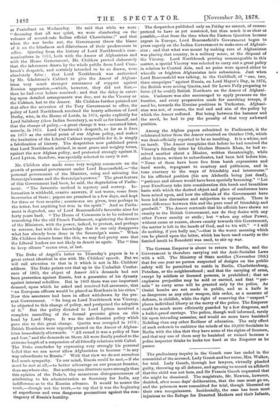The Duke of Argyll's letter to Thursday's papers is to
a great extent identical in aim with Mr. Childers' speech. But we will call attention to that in it which is not in Mr. Childers' address. The Duke points out that up to the Umballah Confer- ence of 1869, the object of Ameer Ali's demands had not been protection against Russia, but a guarantee of his dynasty against internal rebellion. But in 1869 there was one important demand, upon which he asked and received full assurance, that " no European officers would be placed as Residents in his cities." Now this assurance had been in effect withdrawn by the pre- sent Government. " So long as Lord Northbrook was Viceroy, he objected to this change of policy, and postponed the adoption of it." But the policy dictated to Lord Lytton involved a complete cancelling of the formal promise given on this bead by Lord Mayo. It was the anti-Russian policy which gave rise to this great change. Quetta was occupied in 1876 ; British Residents were urgently pressed on the Ameer of Afghan- istan immediately afterwards. " All round it was a policy of fuss and fear," and the demands on Shere Ali were finally pushed to the extreme length of a suspension of all friendly relations with Cabul. The Duke concludes by expressing very strongly his personal belief that we can never allow Afghanistan to become " in any way subordinate to Russia." With that view we do not ourselves feel much sympathy. To our mind, Russia could be met,—if she must be met at all,—to better advantage on our present frontier, than anywhere else. But nothing can illustrate more strongly than this opinion of the Duke's, the monstrous disingenuousness of attributing to his administration as Secretary for India, any indifference as to the Russian advance. It would be nearer the truth,—though not the truth,—to say that it was the beginning of superfluous and even dangerous precautions against the con- tingency of Russia's hostility.


































 Previous page
Previous page